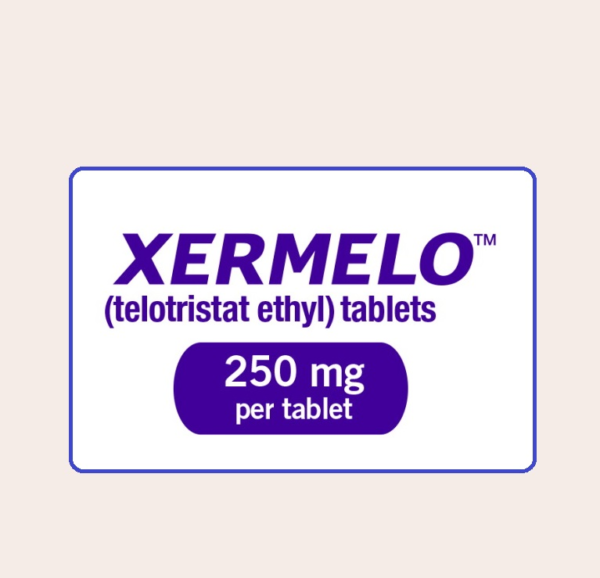Xermelo (Telotristat ethyl) is a drug that is used to treat diarrhea in patients with carcinoid syndrome. It acts by inhibiting the rate-limiting enzyme tryptophan hydroxylase.
Telotristat ethyl Uses:
-
Carcinoid syndrome diarrhea:
- It is used to treat diarrhea in patients with carcinoid syndrome in adults who do not adequately respond to somatostatin analog therapy. It is used in combination with somatostatin (octreotide) analog therapy.
Dose in Adults
Dose in the therapy of diarrhea due to carcinoid syndrome:
- 250 mg per oral three times a day.
-
Missed dose:
- If a dosage is forgotten, it should be taken at the subsequent scheduled time. Avoid administering two dosages.
Use in Children:
Not indicated.
Pregnancy Category: C
- Animal reproduction research revealed negative foetal consequences. Pregnancies ought to be prevented.
Use during breastfeeding:
- The drug's potential for excretion into breastmilk is unclear.
- Manufacturers recommend that you continue breastfeeding or use drug therapy.
- This is based on the risks and benefits for the infant as well as the potential harm to the mother.
- If the baby is breastfed, it should be closely monitored for constipation.
Dose in Kidney Disease:
- CrCl exceeding 20 mL/minute:
- Renal impairment does not affect the pharmacokinetics of the drug if the creatinine clearance is between 20 to 89 ml/minute.
- No dosage adjustments have been provided in the manufacturer's labeling.
- End-stage renal disease (ESRD) requiring dialysis:
- The drug has not been studied in patients on dialysis. Recommendations regarding dosage adjustments have not been made.
Dose in Liver disease:
- Mild impairment (total bilirubin exceeding 1 to 1.5 times the upper limits of normal or AST greater than the ULN):
- Mild hepatic impairment does not affect the drug's pharmacokinetics. Dosage adjustment in patients with mild liver disease has not been suggested.
- If you have a moderate or severe impairment (total bilirubin greater than 1.5 times ULN and any AST), you should:
- The medicine has not been evaluated in patients with moderate and severe hepatic impairment, and the manufacturer has not made any particular dose adjustment recommendations.
Common Side Effects of Xermelo (Telotristat ethyl):
-
Central nervous system:
- Headache
-
Gastrointestinal:
- Nausea
Less Common Side Effects of Xermelo (Telotristat ethyl):
-
Cardiovascular:
- Peripheral Edema
-
Central Nervous System:
- Depression
-
Endocrine & Metabolic:
- Increased Gamma-Glutamyl Transferase
-
Gastrointestinal:
- Decreased Appetite
- Flatulence
- Abdominal Pain
- Constipation
-
Hepatic:
- Increased Serum ALT
- Increased Serum AST
- Increased Serum Alkaline Phosphatase
-
Miscellaneous:
- Fever
Contraindications to Xermelo (Telotristat ethyl):
The manufacturer's listing does not contain any contraindications.
Warnings and precautions
-
Gastrointestinal toxicity:
- Overdosing can cause severe constipation, which may need hospitalization.
- Diagnosis for bowel obstruction should be done for patients who experience constipation with persistent or severe abdominal pain.
- There have been cases of intestinal obstruction and a bowel perforation.
- Patients with advanced carcinoid Syndrome and patients with carcinoid disease, especially, have friable intestinal mucosa that can easily rupture if they become constipated.
- Patients suffering from persistent and severe symptoms should be evaluated. In such cases, the treatment should be stopped.
Telotristat ethyl: Drug Interaction
Risk Factor C (Monitor therapy) |
|
|
CloZAPine |
The serum concentration of CloZAPine may be lowered by CYP3A4 Inducers (Weak). |
|
NiMODipine |
The serum concentration may be lowered by CYP3A4 Inducers (Weak) |
Risk Factor D (Consider therapy modification) |
|
|
Octreotide |
Telotristat Ethyl serum concentration can drop. Treatment: Give short-acting octreotide at least 30 minutes after giving telotristat ethyl, and watch for signs of diminished telotristat ethyl effectiveness. |
Monitoring parameters:
- Patients need to be monitored for stool frequency, constipation, and abdominal pain.
How to administer Xermelo (Telotristat ethyl)?
- It should be administered with meals.
- In patients on concomitant octreotide (Sandostatin), it is best to administer octreotide at least about half an hour after telotristat ethyl administration.
Mechanism of action of Xermelo (Telotristat ethyl):
- Tryptophan hydroxylase is inhibited by it.
- Tryptophan is transformed by this enzyme into 5-hydroxytryptophan and serotonin.
- Tryptophan hydroxylase is the enzyme that limits the rate at which serotonin is produced.
- Patients suffering from diarrhea caused by carcinoid syndrome will experience symptomatic improvement if their plasma levels of serotonin are reduced.
Distribution:
- Because of its high molecular weight, and the acidic moieties in telotristat-ethyl that prevent it from crossing the blood brain barrier, it cannot cross the blood-brain border.
Protein binding:
- About 99% is protein-bound.
Metabolism:
- Telotristat ethyl is hydrolyzed via carboxylesterases to the active metabolite telotristat which is then further metabolized.
Time to peak:
- Telotristat ethyl: 0.5 to 2 hours;
- Telotristat: 1 to 3 hours
Half-life elimination:
- Telotristat ethyl: About 0.6 hours;
- Telotristat: About 5 hours
Excretion:
- 93% is excreted in feces;
- Less than 1% is excreted in the urine.
International Brand Names of Telotristat ethyl:
- Xermelo
Telotristat ethyl Brand Names in Pakistan:
No Brands Available in Pakistan.







